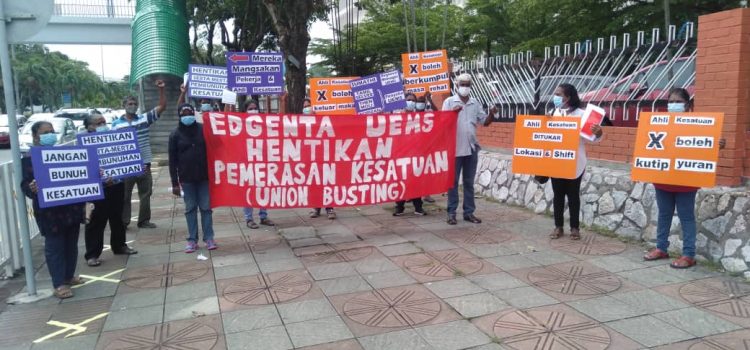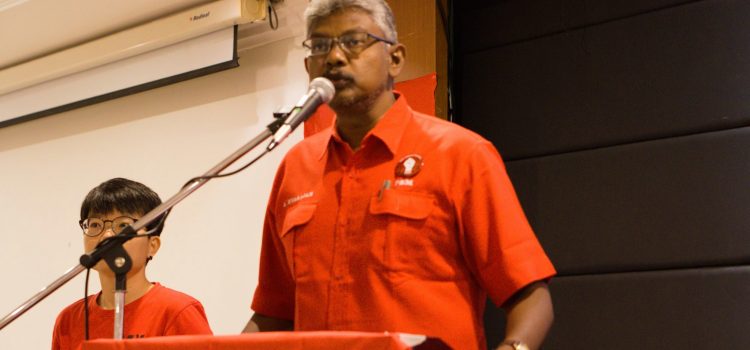


Top Glove Shows the Folly of Private Capitalists!
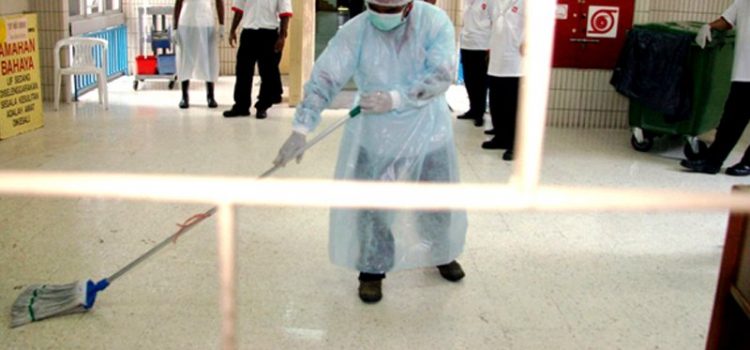
Wira, Wirawati dan Frontliner Yang Dilupa Dalam Belanjawan 2021
“Kami tidur dengan selamat kerana lelaki dan wanita yang bersedia pada waktu malam yang berjaga bertugas pada waktu malam untuk berdepan dengan keganasan yang akan mengancam kita.” – George Orwell
17 November 2020: Jaringan Pekerja Kontrak Kerajaan (JPKK) dan Kesatuan Pekerja-Pekerja Swasta Perkhidmatan Sokongan Di Hospital-Hospital Kerajaan Semenanjung Malaysia tidak bersetuju dengan Belanjawan 2021 yang dibentangkan di Parlimen oleh Kerajaan Persekutuan Malaysia pada 6 November 2020 kerana Belanjawan 2021 telah mengabaikan frontliner atau barisan depan yang memerangi wabak COVID-19. Kami mendesak Kerajaan Persekutuan Malaysia untuk menggolongkan semua kakitangan yang berada di barisan depan pertempuran melawan pandemik COVID-19 agar segera dalam Belanjawan 2021, tanpa mengira kelas, pekerjaan, nilai, atau asal usul mereka.
Pekerja pembersih di hospital, anggota keselamatan sekolah, dan tukang kebun yang mempertaruhkan nyawa mereka setiap hari di barisan depan untuk melawan wabak COVID-19 diabaikan dalam Belanjawan 2021 kerana sistem kontrak pekerjaan mereka. Mereka tidak dianggap sebagai frontliner oleh Kerajaan Malaysia kerana mereka diupah oleh pihak ketiga untuk bantuan sokongan di premis Kerajaan. Oleh demikian, mereka tidak layak dilindungi dengan Elaun Khas COVID-19 sebanyak RM600 sebulan (sehingga wabak tersebut berjaya diatasi) dan pembayaran sekali RM500 sebagai penghargaan atas sumbangan oleh barisan hadapan Kementerian Kesihatan (KKM).
Semasa ucapan Belanjawan 2021 di Parlimen, Menteri Kewangan Malaysia, YB Senator Tengku Dato’ Sri Zafrul Tengku Abdul Aziz berkata, “Kerajaan menghargai usaha dan pengorbanan barisan hadapan dalam memerangi wabak COVID-19 ini.” Walau bagaimanapun, pengecualian barisan depan, wira dan wirawati seperti pekerja pembersih di hospital, anggota keselamatan sekolah, dan tukang kebun yang dilupakan dari Belanjawan 2021 bertentangan dengan ucapann beliau dan juga nilai teras pertama Belanjawan 2021 Kerajaan Persekutuan iaitu untuk Melindungi Kesejahteraan Rakyat.
Selain itu, para wira dan wirawati kita yang dilupai terdedah kepada risiko penularan COVID-19 setiap hari kerana kekurangan Peralatan Pelindung Diri (PPE) seperti topeng muka, pelindung muka, sarung tangan, dan lain-lain ketika mereka bekerja di hospital dan sekolah . Dengan menyediakan PPE kepada pembersih hospital, anggota keselamatan sekolah, dan tukang kebun juga membantu mencegah / menghentikan penyebaran COVID-19 kepada anggota keluarga mereka dan orang lain. Ia dapat membantu meratakan lengkung kadar jangkitan (flatten the curve). Kerajaan Malaysia memperuntukkan sejumlah RM318 juta untuk pembelian PPE dalam Belanjawan 2021, namun kesihatan pekerja pembersih hospital, anggota keselamatan sekolah, dan tukang kebun ini tidak berada di bawah kuasa Kerajaan Persekutuan. Sebabnya, mereka bukan sebahagian daripada penjawat awam tetapi pekerja kontrak yang diupah oleh pihak ketiga. PPE mereka berada di bawah tanggungjawab syarikat kontrak mereka. Oleh itu, langkah-langkah pemotongan kos mungkin tidak dapat dihindari untuk perniagaan, sedangkan Kerajaan dapat memusatkan perhatian pada kos sosial untuk rakyatnya tanpa mematuhi sifat untung dan rugi oleh suatu perniagaan.
Menurut laporan kami, masalah penswastaan sistem sokongan untuk premis Kerajaan merangkumi pembayaran gaji lewat, pembuangan kerja secara tidak adil, tiada kenaikan gaji, dan lain-lain. Penswastaan tidak menyelesaikan masalah penjimatan kos untuk perbelanjaan Kerajaan tetapi memindah masalah tersebut kepada kos sosial seperti masalah kesihatan dan pertikaian di tempat kerja yang memerlukan lebih banyak sumber dari Kerajaan. Sudah tentu, pandemik COVID-19 memperburukkan masalah ini apabila wira dan wirawati kita yang dilupakan tidak dilindungi.
JPKK berkomitmen untuk mengembalikan semua pekerja kontrak di premis Kerajaan untuk menjadi sebahagian daripada penjawat awam sebelum Jun 2021. Seperti yang dikatakan oleh Geoge Orwell, “Kami tidur dengan selamat kerana lelaki dan wanita yang bersedia pada waktu malam untuk berdepan dengan keganasan yang akan mengancam kita.” Kami belum terlambat untuk memasukkan “lelaki dan wanita” dan wira-wirawati kita yang dilupa untuk kembali ke dalam bab buku sejarah kami yang akan dibaca oleh anak-anak kita, mengenai wira dan wirawati kita ketika kita mengalahkan wabak COVID-19!
Kami mendesak Kerajaan Persekutuan Malaysia, Perdana Menteri Malaysia, Menteri Kewangan Malaysia, Menteri Pendidikan Malaysia, dan Menteri Sumber Manusia untuk menggolongkan semua kakitangan yang berada di barisan depan pertempuran melawan pandemik COVID-19 agar segera dalam Belanjawan 2021, tanpa mengira kelas, pekerjaan, nilai, atau asal usul mereka.
Sekian
Dikeluarkan oleh,
1.Jaringan Pekerja Kontrak Kerajaan (JPKK) &
2. Kesatuan Pekerja-Pekerja Swasta Perkhidmatan Sokongan Di Hospital-Hospital Kerajaan Semenanjung Malaysia
Hubungi: Wing Hoong (+60 11 5636 8136)
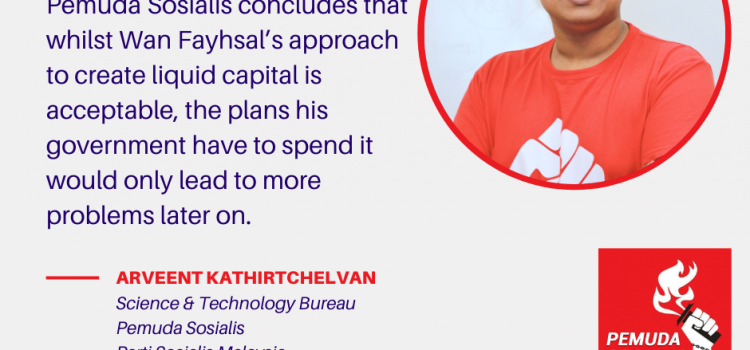
Government Funding Should Be Visionary And Independent Of Taxation

Krisis Air Selangor: Kerajaan Negeri Alpa, Rakyat Yang Merana
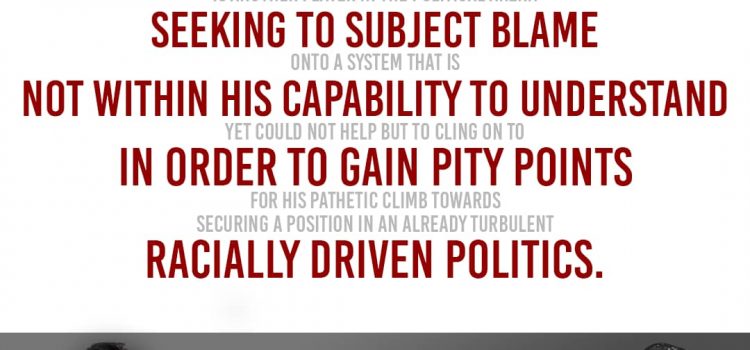
Abolishing the Vernacular School System is not the Solution.
The statement released by Head Armada Nasional Bersatu, Wan Ahmad Fayhsal reflects an elitist individual wishing to maintain a privileged position in the constitution by language policing. It does not reflect an individual that wishes to unite the citizens of Malaysia as what Wan Fayhsal wishes to be portrayed as. Even worse, his argument is detrimental to the discourse on plural society unity as he argued that the fluency in the national language reflects individual nationalism. This gives Wan Fayhsal the impression of being in the know while in reality just nonsense spewed biasedly referencing researches to fit a narrative that will be proven futile in actualising any effort towards unity.
While it is agreed upon that any effort in forming a united plural society starts from the most primary level of education, vernacular school system is collateral to the plural society itself rather than a plague to the system. Vernacular school system has been embedded deeply within the tapestry of Malaysian Education System. It has been a mean of cultural identity preservation just as how Islamic religious school is a mean to preserve and strengthen the Islamic religious identity of the students enrolled. Thus, to abolish the vernacular school system on the basis of the lack of national language fluency in reflection to individual nationalism will be counterproductive to the initial effort. To take away a mean of cultural preservation is to take away what Malaysia has been portrayed as; multiracial plural society tolerant of each other’s identity. A conformity of national language fluency is not a magical solve all for the problems of unity in Malaysia. Even if all the students within the education system are put under a roof with the jigsaw classroom model, unity will still be out of reach as long as the Head Armada does not reflect inward on the causes of a disruptive discourse on unity.
Wan Fayhsal may give out a narrative of language as the basis of unity and vernacular school system embraces differences in language usage which will consequently disregard a prioritisation of the national language. He is speaking from a viewpoint of a politician that is playing on the sentiment of the people and not from the viewpoint of an individual that values the education system itself. S. Gudschinsky posited that student’s fluency in their mother tongue can be transferred to a second language thus allowing a beneficial exposure to second language. For C. Eastman, native language usage will foster a good-home working relationship. Learning difficulties were also documented among minority children with an inadequate grasp of medium of instruction by multiple linguists from C. Bowen to J. Macnamara to name a few. Does Wan Fayhsal even have the best for the citizens at heart or simply revisiting sentiments that had existed since the release of Barnes Report to fulfil the requirement as a folly politician? If the fluency of national language is reflective of one’s nationalism, can this statement by Pemuda PSM written in English be reflective of a collective that is going against the best of the Malaysian people?
Pemuda PSM wishes for a united Malaysia as well but unity should not be built on the basis of erasing the cultural identity of the minorities. Vernacular school wasn’t built to be divisive for the people but any narrative that painted it as such is. If education is the main concern in the development of a united plural society, Wan Fayhsal should have been aware on establishment of Islamic religious school in Malaysia as the breeding ground for religious fundamentalism resulting in the decline of Malays’ cultural identities while being the major race itself. In relation to the education system itself, why should the vernacular school system be the target of the narrative of a disruptive system when tertiary education system allows for universities to prioritise only the majority race on the basis of affirmative action? Why should education be the target when individuals like Wan Fayhsal freely stoke the flame of racial issues through racial politics?
It should have been obvious that Wan Fayhsal’s statement was built on an unsubstantial ground. The referencing of 1996 Education Act and the work of Prof. Dr. Teo Kok Seong is only to build a narrative on vernacular school system that does not have a correlation to the issue of unity in Malaysia. He is another player in the political arena seeking to subject blame onto a system that is not within his capability to understand yet could not help but to cling on to in order to gain pity points for his pathetic climb towards securing a position in an already turbulent racially driven politics.
AHMAD YASIN
PEMUDA PSM EDUCATION COMMITTEE
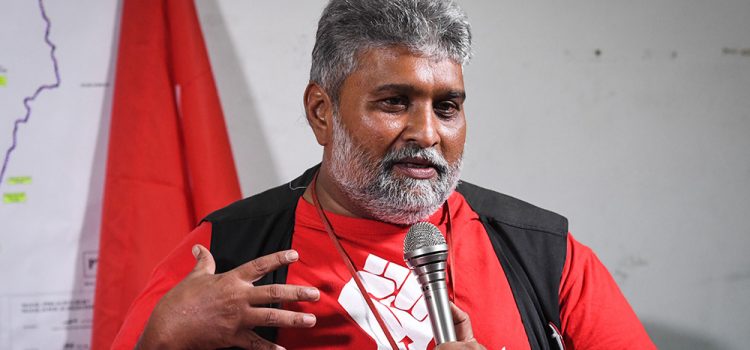
*Local Government Election Betrayal*
Parti Sosialis Malaysia (PSM) today lambasted Local Government and Housing Minister Zuraida Kamaruddin for backing down on the local government election issue, saying it was sad that she had given up so easily while citing lame excuses.
“This shows that someone who has been so brave previously in breaking party ranks (when in PKR) is now not prepared to do it this time in spite of making all the arguments why local government elections are good,” said PSM deputy chairperson S Arutchelvan (above) in a statement.
“While today, they keep talking about racial considerations, the main reason (for opposing local elections) is because these parties want to appoint political loyalists rather than (allow the) people to have elected representatives.”
Arutchelvan was responding to Zuraida’s announcement in the Dewan Rakyat today that the Perikatan Nasional government would not hold local government elections, saying that both society and local governments were not ready for “the drastic” move of council elections.
The former local councillor for the Kajang Municipal Council reminded Zuraida that far from being a drastic change, local government elections existed in the 1950s and 1960s at a time when the country had fewer facilities and poorer technology.
Zuraida Kamaruddin
“Therefore it not a new thing like (that we should keep) debating as if it is something out of the world. A majority of countries in the world have the third vote,” he added.
Taking a walk down memory lane, Arutchelvan said local elections were held in the country in 1958 and 1963.
“They were suspended because of the 1964 Confrontation with Indonesia and the Emergency (Suspension of Local Government Elections) Regulations 1965, not because of the May 13, 1969 racial riots.”
This had followed a period when the Socialist Front coalition of the Labour Party and Parti Rakyat Malaysia had done very well in local council elections, winning the mayorship of Penang under DS Ramanathan.
Arutchelvan cited that a Royal Commission of Inquiry (RCI) to investigate the working of local governments in West Malaysia was established in June 1965 for this purpose and led by Senator Athi Nahappan and it concluded after four years that local government elections must be conducted and needed to be extended to more areas.
“These Royal Commission findings were not implemented, similar to how the Police Complaints and Misconduct Commission (IPCMC) Bill drafted by another RCI has not been implemented,” lamented Arutchelvan.
PKR’s Tanjung Malim MP Chang Lih Kang (photo) also weighed in, expressing his “grave disappointment” over Zuraida’s announcement.
“The latest announcement is a complete turnaround from her own statement she gave in the Parliament barely a month ago.
“On July 14, 2020, the minister informed the august House that the ministry has set up a policy and operations committee to study the legal and financial aspects as well as the mechanism for implementation of local government elections.
“She also assured that a paper would be tabled in the cabinet by mid-2021,” said Chang, who is also PKR spokesperson for housing, local government and infrastructure.
“In less than a month, the minister has gone back on her words. I am of the opinion that local government elections would strengthen local democracy significantly. There might be issues that we need to deal with along the process, but the idea is worth to be given serious deliberation.”
He said the minister should not decide hastily and unilaterally on such important policy, especially when resources and manpower have been allocated to conduct a feasibility study.
“She should have waited for the outcome of the study and make a considered decision based on findings but unfortunately, the minister yields to political pressure and made an imprudent decision,” Chang said, adding that Zuraida had “failed her test.”
S.Arutchelvan
6 August 2020
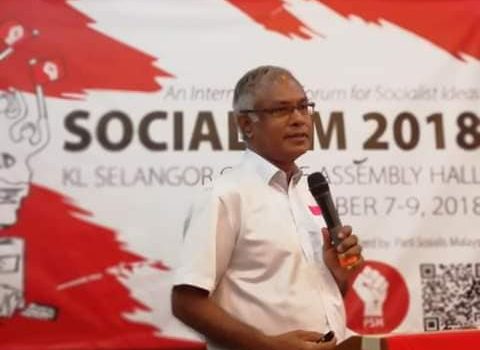
Kegagalan Pakatan Harapan: Pertembungan Naratif?
Diharapkan, untuk kali kedua nanti, pemimpin reformasi akan lebih menyedari ketegangan di antara naratif yang berlainan berkaitan dengan ciri masyarakat Malaysia dan bagaimana mahu mendepaninya, tulis Jeyakumar Devaraj.
